40 Years A Prisoner Review TIFF 2020
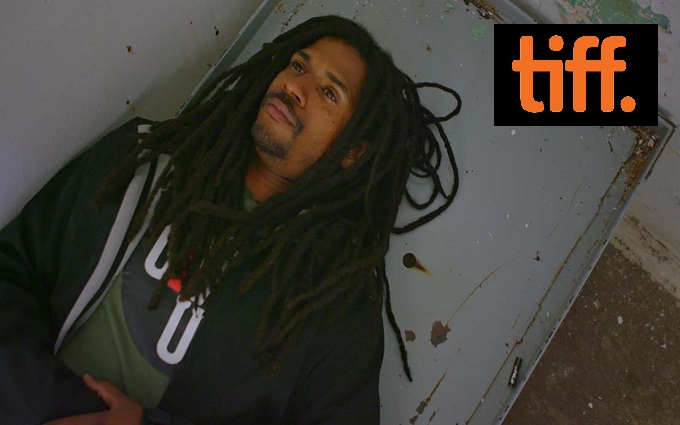
The Plot
This HBO documentary provides an explosive and detailed account of the bitter 1978 stand-off between an activist commune in the heart of Philadelphia and the city’s police. The lengthy siege ended with the death of a police office and nine MOVE activists receiving maximum sentences of between 30 and 100 years in prison. This film explores that controversial history through the eyes of Mike Africa Jr, whose parent both have spent 40 years in prison while he fights for the release and to bring attention to their story.
The Good
This ruthlessly detailed and unflinching documentary does an effective job at documenting both sides of the raging conflict and a forensic examination of its infamously violent collusion. The battle between the anarchic MOVE compound and the allegedly vicious police force is wildly relevant to the current war raging across the United States between BLM and ANTIFA activists and increasingly embattled law enforcement agencies. Explosive racial tensions and how mainstream society deals with irreconcilable aggressive political activism are still deeply urgent questions in 2020.
While this film obviously shine’s a fierce light on the apparent violence of police tactics of that era and the grim reality of subsequently incarcerating people almost indefinitely, it is also commendable that the film is even handed in presenting the balanced perspective of those who identify ways in which the MOVE commune pushed authorities into unavoidable conflict through their own actions which were fuelled by largely incoherent rhetoric and legitimately dangerous criminal behaviour.
Frequently in the film the opinion is voiced that MOVE’s fate was largely self-inflicted and could have been easily avoided had they chosen to simply deescalate the conflict and abandon their literal fortress stronghold. Even those who support a more balanced punishment for terminally imprisoned members will likely be forced at times to concede that there is some truth to that shared blame.
The film does an excellent job at putting an intimate human face onto a seemingly endless war between activists, law enforcement and the justice system. This documentary is not just an act of lopsided political propaganda, it is a true examination of all facets of this violent incident and the decades long struggle for freedom that followed it for one family.
The Bad
This documentary will likely not succeed in shifting people’s deep rooted and firmly entrenched views on which side bears the moral weight for the brutal conclusion of this conflict. At the time of these events American society remained fiercely divided between those who saw MOVE as violent cult that pushed the city’s police into regrettable but unavoidable action and those who saw the actions of the police as being unjustifiably brutal and oppressive.
In 2020 against a backdrop of seemingly endless riots across America in response to perceived police brutality it’s hard to ignore the parallels. But this particular piece of history will not do much to change people’s hysterically passionate views on why so many American cities are being set aflame both literally and metaphorically. It’s a sad truth that many the aggressively polarized views showcased in this documentary are just as alive in the present day.
While the film may convince audiences that many people within the US prison system are being cruelly denied even the possibility of release in ways that are wildly disproportionate to their actual crimes, it’s perhaps unfortunate that the MOVE group will still be considered deeply unsympathetic by many even after 4 decades. It’s a point often acknowledged even by those who support the long struggle to release the convicted MOVE members that their fiery rhetoric and confrontational behaviour confuses the issue of their ‘innocence’ and distracts from any guilt assigned to law enforcement.
The Ugly Truth
40 Years A prisoner is a well-made examination of a conflict that is eerily echoed in the present day. It is an even handed presentation of facts that will likely continue to divide opinions fiercely. It is a timely examination of the often viciously violent conflict between Black activism and authorities
Review by Russell Nelson
Pieces of A Woman Review TIFF 2020
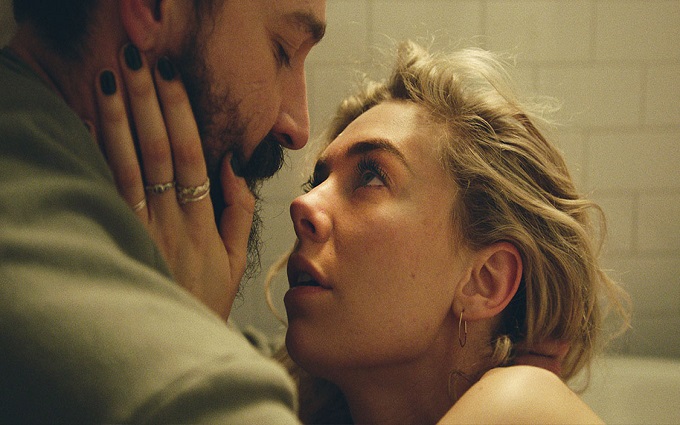
The Plot
An unblinking account of a young couple from different backgrounds navigating the most painful loss imaginable when the planned home birth of their first child spirals into unspeakable tragedy.
The Good
At a time when the cinematic landscape is so often dominated by fantastical special effect fuelled escapism, this film immediately feels like a more raw form of powerfully simple human drama.
Traumatic childbirth and the loss of a child is something so taboo and deeply unsettling that there isn’t actually a word in the English language to describe this kind of loss. Giving that nameless and all too often unspoken pain a voice in this unflinching intimate dramatization is perhaps an important step in destigmatizing the ocean of grief and confusion it creates.
While for many it will be utterly daunting to confront this horror on screen, it may offer audience at least some hope of comprehending the experience of families who survive this ordeal and for those who have it may serve as a chance for catharsis.
Shia LaBeouf is a young actor who has emerged from the shadow of his highly publicised personal demons and professional missteps to become a truly compelling and uniquely visceral adult performer. His output in recent years as a director and performer alike have moved miles towards redeeming himself for admitted past failings. Few actors have the capacity for raw blistering anguish that he has so frequently demonstrated in recent performances. It’s difficult at times to believe there was once a time when he was trading poorly scripted quips with dancing CGI robots.
His performance as Sean a working class man evidently haunted by past demons and faced with a furious search for blame and explanations is utterly heart-breaking. It is a truly raw and accurate portrait of the flailing effort to survive. His desperate efforts to maintain some shred of normalcy and protect their relationship from being completely annihilated by grief is utterly agonising viewing. Particularly as it disintegrates into more self-destructive behaviour.
Vanessa Kirby as the other half of this devastated couple has already collected top acting honours in Venice for this performance. As her star continues to rise ceaselessly this is a physically and emotionally demanding performance that showcases the full intensity of her talents. Her performance is devastating and riveting in equal measure. Kirby carries the full crushing weight of her character’s journey in every scene. Her performance is wracked with a more introverted agony than LaBeouf’s performance. While she may at first appear to be irretrievably muted her gradual momentum carries her towards a bravely articulate and cathartic climax.
Veteran acting icon Ellen Burstyn is another vitally important piece of this complex drama, playing Kirby’s strong voiced mother that carries her own weight of desperate expectations and lived experiences into the already nightmarish situation.
The contrast between how these different people process the mountain of grief and unanswerable questions they are inescapably faced with shows the complete spectrum of the human experience of loss. It is a heart-breaking anguished cry torn constantly between fits of rage and totally numb detachment. The fact that it leads eventually towards some form of healing and recovery is an uplifting statement about the power of the human spirit.
The Bad
The subject matter of this unflinching and traumatic piece of filmmaking will likely be simply too difficult to bear for those whose own lives have actually been touched by the most devastating experience of losing a child. While it is perhaps important to have that most extreme form of human suffering explored on screen, it is a daunting prospect for anyone but especially those most vulnerable.
Inevitably some people will seek to use the film as a tool for explicitly highlighting the dangers of ‘home birthing’. Such is the intensely emotive nature of this medical debate that the film will likely also draw fire from those concerned about stigmatizing home birth. They will point to the film being fiction. Either way it’s inescapably inflammatory.
Given the wildly different ways in which people process unimaginable grief in their own lives it’s also inescapable that some people will find it immensely difficult to relate to the different stages of the specific journey these broken characters go through. There is perhaps nothing more alienating and corrosive to our understanding of each other than the way in which we respond to the most extreme trauma.
Even if the film’s ultimate message of the possibility of eventual recovery is of universal appeal, the path the film and these excellent performances maps to reaching it may provoke difficult emotions and dissent among audiences.
The Ugly Truth
Pieces of A Woman is a traumatically powerful examination of one of the most devastating personal traumas human beings can experience. While it will be unbearable for many to watch, those that choose to will at least find some solace in knowing that this kind of pain has been authentically and respectfully dramatized. Perhaps this is most important given how often unspoken this experience is in the lives of real families affected touched by such heartbreak.
Review by Russell Nelson
76 Days Review TIFF 2020
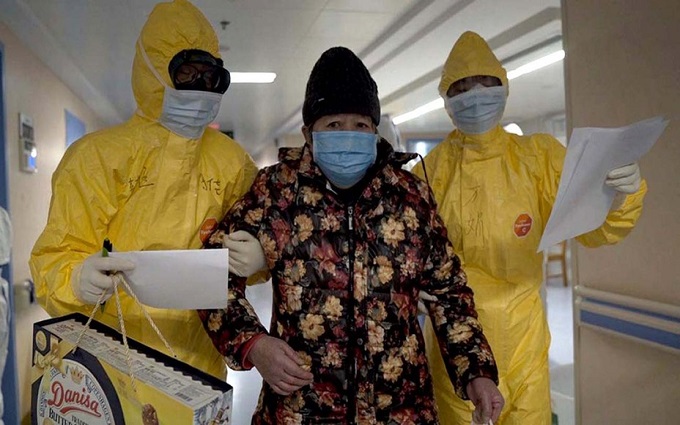
The Plot
Director Hao Wu’s & Weixi Chen’s detailed documentary account of life inside the 76 day lockdown in the Chinese city of Wuhan. The original epicentre of the COVID 19 global pandemic. Following a small team of hospital workers as they struggle to deal with the unprecedented medical crisis and a relentless stream of patients.
The Good
It’s hard to understate the global appetite for some degree of understanding about the reality of the frontline in what has become a global war against a virus. As the original source of the outbreak Wuhan a city of 11 million people has long been the focus of much of that global scrutiny and deep desire for answers. Given the fiercely secretive nature of the Chinese government, the reality of the 76 day long lockdown in this particular city has long been a natural focal point for that intensive international interest.
Given the previous absence of any evidence of the unique experience of this city, this documentary instantly becomes deeply significant as the first globally accessible first had account. In many ways what the documentary does or indeed doesn’t show is equally important. Even if it has potentially been filtered to appease the Chinese government by ensure the most positive presentation of the heroically humane medical efforts. It is at least any kind of footage that has allowed to escape the social media blackouts and deeply private Chinese state.
Accepting the footage as authentic documentation of life with a Wuhan medical team it showcases an astonishing degree of dedicated kindness and compassion by medical professionals doing their best to care for COVID 19 patients in the most complete sense of that word. It’s a place where every nurse or doctor wrapped in layers of PPE, hazmat suits and safety goggles seemingly still makes time to hold the hand of frightened ‘gradma’ or forge astonishing conversational connections with young mothers, grandpas and anyone else under their care.
The intimately shot footage appears to have been made with completely unrestricted and continuous access. From an astonishing opening sequence where one woman surrounded by a crowd of PPE clad professionals reacts hysterically to the death of her ‘Papa’, it’ startling to see such raw human anguish actually being shared on screen.
The film is packed with an endless array of small moments of human kindness and despair that gives an emotive impression of what life inside a COVID 19 ward could truly be like. For many who have sought to understand this reality better this will be compelling and deeply impactful viewing.
The Bad
With increasing global cynicism about both the reality of the disease and the way international government particularly the Chinese government have handled this crisis, there will undoubtedly be many who question the validity of a documentary like this which claims to offer such a complete record of life inside the previously deeply secretive epicentre of what ultimately became a global pandemic.
There are those that will immediately seeks to dismiss footage of Chinese medical staff bravely battling to save patients with relentless kindness and surprising calm as most likely merely an act of state censored propaganda. Some will accuse the filmmakers of selective presentation of footage to show the Chinese virus response in the most rose tinted light, others will go further and accuse the filmmakers of outright fabrication.
The film’s astonishing production values and camera work will no doubt be held out as evidence that the film is more artificial that it would admit. The constant presence of the camera in what would even under normal circumstances be a fraught and deeply private environment is truly surprising. As is the fact that the footage has a perfectly framed seamlessly edited quality that would put the most expensive multi-camera medical drama series to shame.
The filmmakers would defend this as merely an act of skilled camerawork and effective editing. But it is a little odd to comprehend how a small or even singular team of filmmakers could possibly have organically captured so many conveniently powerful moments in a claustrophobic environment populated by hazmat suit clad medical workers frantically battling to save a tsunami of the sick and dying.
Likewise while many people will no doubt hope to find wider answers about the origin of the virus or the true scale of its human impact in this footage. In reality those fundamental questions about this disease remain unanswered. At best this is a small scale portrait of the lives of specific medical workers, not some sweeping revelatory analysis of a global event of historic proportions.
The Ugly Truth
76 Days is a slickly produced documentary which if taken as truly authentic, shines light on reality inside the epicentre of the pandemic which has swept the world in 2020 with truly devastating consequences. Though some may question what the documentary doesn’t show, it does display an astonishing array of deeply human moments. It feels like a real portrait of desperately sick people and the kindness of those seeking to save and comfort them.
Review by Russell Nelson
Wolfwalkers Review TIFF 2020
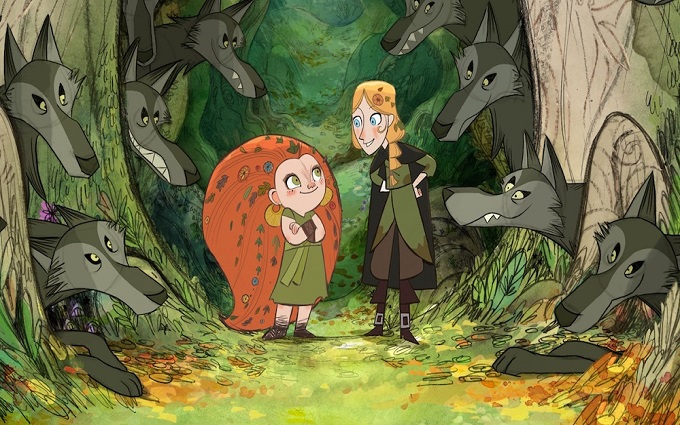
The Plot
In 17th century Ireland during the height of Oliver Cromwell’s puritanical reign a hunter’s young daughter ventures out into the untamed woods and strikes up an unlikely friendship with a wild girl. Their powerful newfound bond potentially holding the key to saving them both and the magical wolf pack that protects the forest.
The Good
The Oscar nominated animation studio behind The Secret of Kells, The Breadwinner and Song Of The Sea once again deploys a stunning combination of uniquely whimsical 2d animation, excellent performances and evocative soundtrack to bring another slice of Celtic folklore magically to life on screen.
As astonishingly effective voice cast boasting the familiar sounds of Seam Bean breaths even more rich life into lusciously animated characters that live with a magic of their own. Honor Kneafsey and Eva Whittaker are two sparkling young vocal talents that fit perfectly with the young friends from radically different worlds. Their infectious spirit and sincere affection for one another is a powerful force in giving the film immeasurable heart.
The film’s fantastical story also serves as an elegant allegory for the tension between tyrannical puritanism and a more free spirited natural order. The films historical setting is distant enough in time not to interfere with the authentically mythical aura it creates. But for those older audiences familiar with that portion of British history it does lend the film an additional layer of meaning.
The beautiful rendered and uniquely styled 2d animation has a vivid organic quality, reminiscent of the very finest offerings of Japan’s iconic Studio Ghibli. It’s a testament of the true power of this more traditional and deceivingly complex art form that it is able to capture the vibrant untamed spirit of nature in a way that few live action films are ever able to achieve.
Like most of the most timeless fables this story draws upon a deep history of mythology and the raw liberated power of nature juxtaposed fiercely against man’s frequently destructive and oppressive nature. Wolves have long served as a common symbol of that fusion between true magic and nature, lending this story of the women who help bridge that divide a weight of mythic power.
The film is undeniably gorgeous to look at and moves with a fluid pace of brisk action and adventure. But what will likely linger with audiences most is the rich spirit of the film and the vivid dream world it so evocatively taps into.
The Bad
Perhaps for the very youngest audiences some of the film’s darker subtext will at times be a little too mature. Though they will undoubtedly enjoy its many playful joyous moments and lovely comforting visuals, they may not quite absorb the full weight of the film’s darker elements. However for older children and grownups alike the film can be richly enjoyed on several different levels.
Perhaps those most fiercely loyal to historical accuracy may find the liberties the film takes with turning Oliver Cromwell into a fairy tale villain. However the filmmakers would likely defend this as being an attempt to capture the spiritual truth of Ireland’s experience with British rule rather than a literal retelling.
The Ugly Truth
Wolfwakers is a visually enchanting fantasy adventure and a near perfect piece of family filmmaking. It has an authentic spiritual charm and poignant whimsy perhaps missing from the recent trend of endless animated sequels. It is original modern storytelling imbued with the deepest magic of the past.
Review by Russell Nelson
MLK/FBI Review TIFF 2020
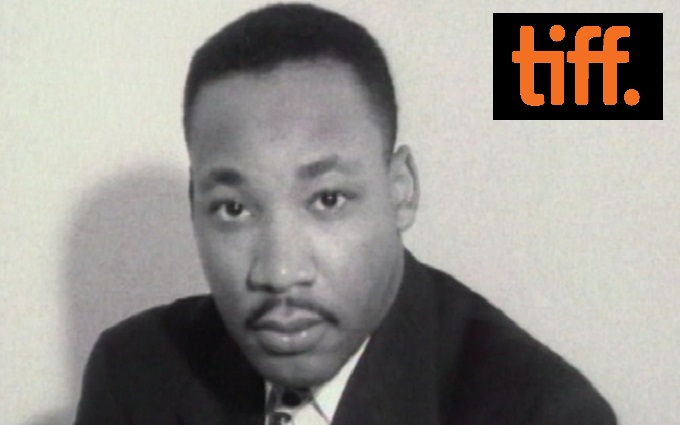
The Plot
A documentary film exploring newly declassified US government documentation of the FBI’s relentless surveillance campaign against Martin Luther King Jr.
The Good
Director Sam Pollard has carefully assembled a complete visual record of the fraught and deeply adversarial relationship between Nobel Prize winning civil rights spokesman Martin Luther King Jr and J Edgar Hoover’s FBI.
In 2020 this diligently detailed documentary account of a darker time in American history serves as a useful reminder of where humanity has been and just how far the wheels of progress have already turned. Archival footage of the openly violent conflict that tore apart the very fabric of American society during the 1960s perhaps puts some of our present day concerns into context.
Martin Luther King Jr remains one of the most iconic and influential voices of modern history and this film contains a vast reservoir of some of his most eloquent and persuasive public oration on the always emotive and dangerous issues of racism. Many of his words resonate with the same passion and intelligence today as they did over half a century ago.
This documentary provides audiences with a dramatic reminder of the alternative to simple blind rage in the face of our problems. It also speaks strongly to the abuse of power often possible by law enforcement agencies operating with apparent impunity.
The film is a good starting point for anyone hoping to learn from the mistakes of the past and speaks powerfully to our present day lives on a number of different levels.
The Bad
Whilst this documentary is well assembled and will no doubt serve as a useful historical introduction for those of a younger generation discovering this chapter of world history for the first time, most people familiar with even the most general details of Martin Luther King Jrs life and political struggles will uncover relatively little that they did not already know. The facts that Dr King was the subject of intensely prolonged scrutiny by law enforcement and that his private life was more sordid and complex than his public persona as a spiritual leader have long been accepted facts.
While this documentary serves as a good archive of King’s own eloquent words and provides a solid record of the exact scale of FBI intrusion into his life and inner circles. It does truly unearth any fresh revelations and does little to change a now well established narrative about Martin Luther King Jr. Given all the obvious forces of violent oppression that Dr King literally faced, it perhaps seems slightly less important to focus so exclusively on this narrow aspect of unethical law enforcement monitoring.
The Ugly Truth
MLK/FBI is a well-crafted and concise account of two of the most influential and controversial political figures of the late 20th Century. The conflict between them illustrates many of the polarizing ideals and tensions that still seem to threaten the stability of our increasingly perilous present day.
Review by Russell Nelson